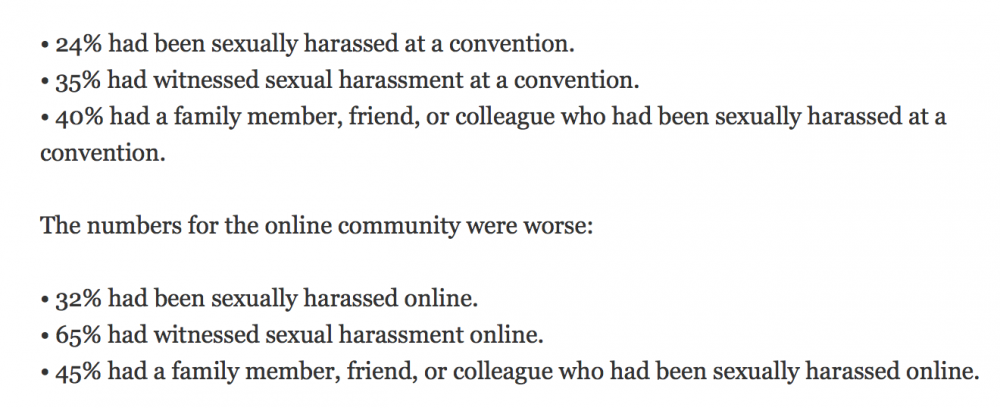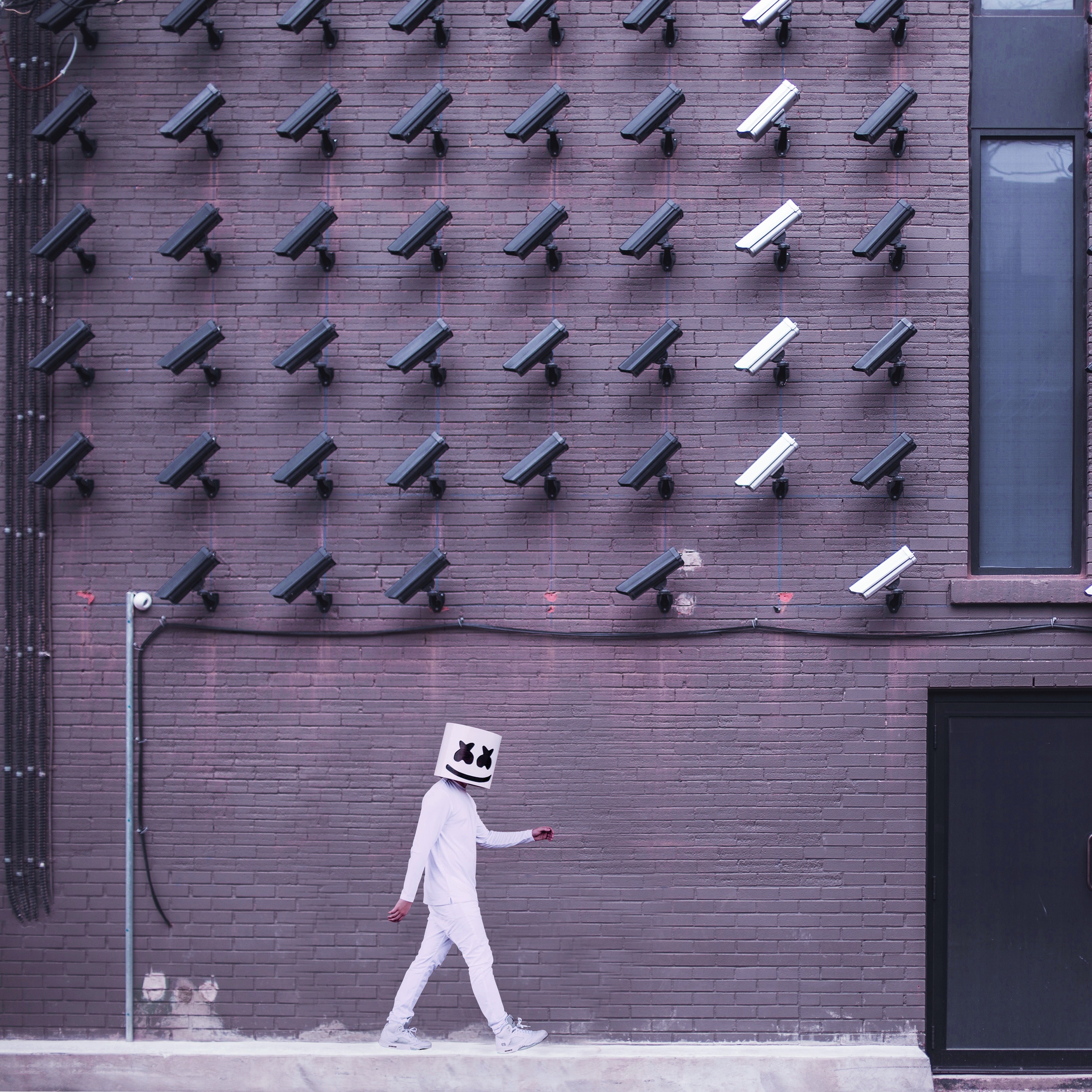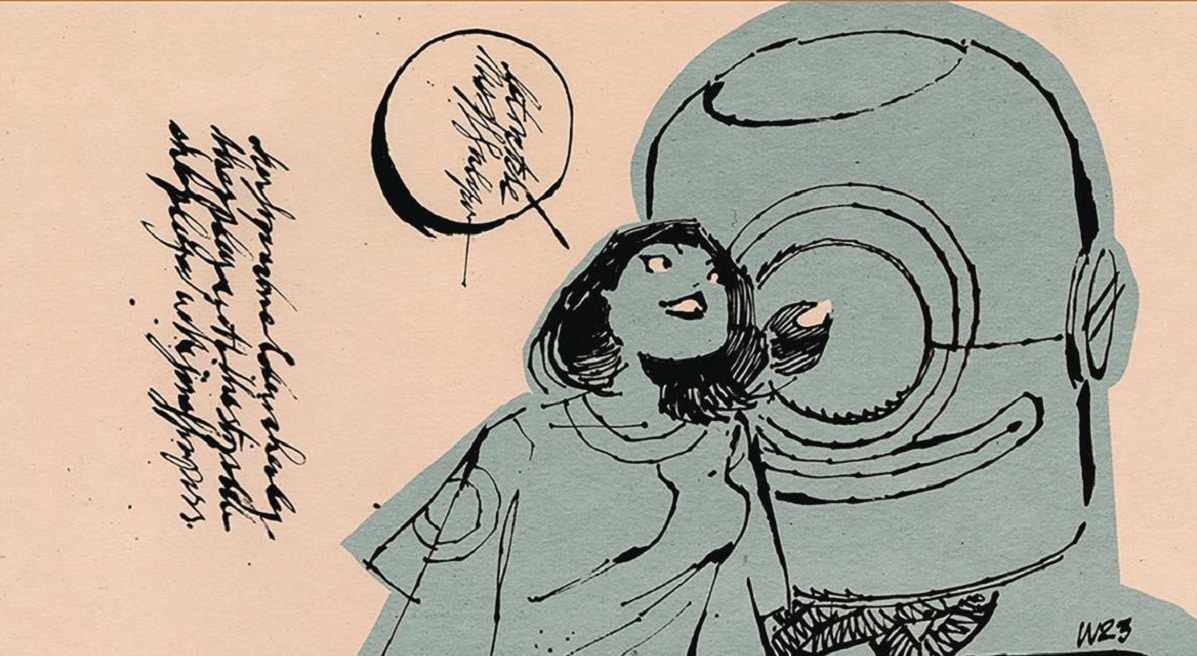Conventions are truly a sight to behold. The throngs of people milling about, enjoying and reveling in cosplay, panels, and discovery. People are filled with a wonderful frenetic energy and palpable excitement, but too often this energy can gloss over a serious problem still facing many convention-goers. Sexual harassment remains a troubling component of convention culture and with New York City Comic Con just a few short weeks away, it’s a topic worth revisiting.
Over the Labor Day weekend author Jess Nevins, perhaps best known for his annotations for the League of Extraordinary Gentlemen, published a blog detailing the results of an informal survey on sexual harassment within the science fiction and fantasy (SFF) community. Conducted over the course of two weeks, the survey revealed what many have already known or feared: sexual harassment remains an ongoing and troubling problem at conventions, within the workplace, and online.

Sexual harassment is a global issue affecting how people work, live, and their quality of life. According to a 2017 Pew Research Center survey on online harassment, nearly four-in-ten Americans have personally experienced some kind of harassment online. One-in-five Americans have been subjected to more serious forms of harassment including stalking, sexual harassment, and physical threats. Women and minorities were harassed more often than other groups. Within the workplace, an April 2017 YouGov poll, revealed one-in-three American women had experienced harassment. The issue of sexual harassment may extend beyond the comics and SFF communities but we have a duty to our community and those in it to stop and prevent it from happening.
Sexual Harassment: Unwelcome sexual advances, requests for sexual favors, and other verbal or physical conduct of a sexual nature. –Equal Employment Opportunity Commission
Speaking over email about what spurred the creation of the survey, Jess Nevins says he was troubled by stories of harassment from convention-goers and recent revelations concerning well-known Science Fiction writer’s history of groping. Most troubling for Nevins was that many were aware of this individual’s behavior but decided not to step in to stop or prevent it. Nevins’ survey is one in a series of articles in recent years which illuminate the issue of harassment at conventions.

Each convention season brings a fresh wave of articles about harassment and consent. In 2013, essayist Elise Matthesen shared her experience of sexual harassment at WisCon. Matthesen’s detailed accounting of what it was like to report the incident to officials was a revelation, highlighting the often inadequate reporting and enforcement mechanisms in place to prosecute those accused of harassment.
Writing for Bitch Media, Janelle Asselin detailed the results of her survey about sexual harassment in comics conducted in 2014. Of the 3,6000 responses the majority (59%) agreed harassment was an issue. Twenty-five percent of those surveyed reported experiencing sexual harassment themselves. Harassment at conventions was discussed again in 2015 with a piece appearing in the Los Angeles Times and once again in 2016, this time on the website Gizmodo. Despite this greater awareness, the establishment of zero-tolerance harassment policies, organizations like Cosplay is NOT Consent and the BackUp Ribbon Project, the results of Nevins survey suggest too little has changed. When asked for his opinion on what the survey indicates about where the breakdown of communication regarding what sexual harassment is and how to stop it, Nevins said the following:
“I refuse to believe that there aren’t male witnesses to the harassment and groping. I think men just aren’t taking action when it happens, and that’s where the failure is occurring. I think conventions could do a better job of regulation and enforcement, but I think men need to do a far, far better job of policing each other.”
Nevins believes more widespread adoption of zero-tolerance policies and increased security presence could help deter would-be harassers. Prevention, however, must go beyond convention season. The science fiction and comics community must be less hospitable to harassers. “I’d like to see the industry as a whole take a firmer stance with harassers.” Nevins stressed the role employers play in this, “Don’t enable them by letting them work for you after they’ve been harassing fans and authors; fire them!”
Giant cosplay is not consent sign right by the NYCC entrance. Very nice. pic.twitter.com/QGu1qhci6N
— Brian Dorfman (@bdorfman) October 9, 2014
Everyone has a role to play in preventing and stopping sexual harassment, especially men who implicitly enable harassment through inaction and silence. It’s up to us to believe victims who report harassment and this is especially true for convention organizers. Nevins says he was troubled by the number of survey responses which included comments about convention-goers being dismissed by staff after reporting harassment. To improve reporting mechanisms, Nevins suggests convention organizers provide extra sensitivity training, add more women to convention security, and strictly enforce all posted policies.
Abusers hide in plain sight. Harassers rely on the silence of those around them and societies prevailing sexist attitudes. They take advantage of weak reporting mechanisms and the culture of shame and fear that surrounds sexual abuse. The good news is we can all do something about it. We can call our harassers and demand accountability at our places of work and shared community spaces. Most importantly we can believe victims, full stop. Victims are never to blame for the actions of their harassers. To help prevent and stop sexual harassment we must eradicate the environment would-be harassers live in and thrive on.
“SFF, like comics, has a structural problem, where men in power abuse that power and are allowed to do so by both fans and other people in power. Structural problems are best addressed by other people in power. Sure, I’d like to see the average fanboy be on the look -out for gropers–but we need publishers to fire editors who harass, not just ignore the complaints about them.”
For more information about New York City Comic Con’s anti-harassment policy click here.






It’s his list of “blind items” that upsets me most.
I get why Nevins and other bloggers/journalists don’t name names when they have them, but it’s always so disheartening when one of their victims finally goes public, and the response from the fan press is never shock and outrage but “Oh good, we can finally talk about this thing we’ve known for years.”
You can’t formally publish names and habits without risking a lawsuit that you can’t defend without a lot of money and at least one victim willing to back you up, fine, that sucks but I get it. Can y’all at least GOSSIP better??? At least TRY to flow down this information to the vulnerable fans???
This site and others like it also bear the same responsibility you place on “men who implicitly enable harassment through inaction and silence”. Why not name names? You’re playing it safe and SILENT.
What is the NAME of the “well-known Science Fiction writer”.
Not naming the “well-known Science Fiction writer” is ENABLING.
I can’t afford to be sued. That’s basically why I don’t name names or make blind items that are easily guessable.
Besides, the point isn’t that author X is a harasser. The point is that it’s pervasive, and goes to the very top of the field.
@Jess Nevins: You offer yourself personal absolution because you don’t want to be sued—fine, then don’t point the finger at men who you decree should be “policing” each other. Are random men supposed to leap in and risk the lawsuit that you’re trying to avoid? Are THEY the ones that need to put THEIR money where YOUR mouth is?
I believe the point is ENTIRELY that author X is a harasser, because the person doing the harassing should get the blame, not random bystanders.
@Jimsays – as even a moment’s reflection will show, there is a substantial difference, in reality and legally, between intervening in real life when harassment/predation is occurring, and naming someone as a harasser/predator in print or publicly. The latter falls under libel & slander laws; the former counts as preventing a crime. Not quite sure why you’re so obtuse about this.
And of bloody course men should be policing each other. They are witnesses to and enablers of harassment/predation; they stand by while women are groped and harassed–when they’re not encouraging it. It’s time men started to get their act together and prevent the harassment and predation rather than be a party to it.
@Jess Nevins: I get the feeling that your life experience in this department is entirely theoretical. Sure, if someone is obviously being harassed, any bystanders (men AND women) should absolutely step up and help, but apart from the most overt and egregious examples, harassment is almost impossible for a casual observer to accurately identify on the fly. I can assure you based on personal experience that stepping blindly into the middle of a situation between two adult strangers is a recipe for a misunderstanding that will likely result in a physical confrontation (and potentially an arrest with the person you were trying to “help” testifying against you).
Harassers are absolutely WRONG. No dispute. But, you’re passing blame from Harassers and the people who enable and encourage them (who themselves are essentially harassers) to random, male bystanders. Not even remotely the same thing.
If you expect random, male bystanders to take a risk, you need to be willing to take one yourself. If you have special knowledge of who the harassers are, and you’re certain of your facts, then you should share their names. Otherwise, you’re passing the buck of responsibility to other people and claiming the moral high ground.
@Jim says
So an “Everything is okay here, I thought you may need help” would «result in a physical confrontation (and potentially an arrest with the person you were trying to “help” testifying against you)» ? Please.
Do I really have to explain how this is done? Okay. You are at a place and see what you believe to be some form of harassment. For this example, it doesn’t matter what kind. You walk up, make direct eye contact with all people involved and say;
“How’s everybody doing? Anything I can help with?”
Don’t be loud, but be direct and use a normal, well mannered speaking voice. Be sure to enunciate properly.
You have confronted everyone involved, made the most basic, non confrontational questions there are in a non accusatory manner and most bullies and harassers are, at heart, cowards.
Be sure to smile.
Bullies and cowards hate a warm, sincere smile.
@Douglas A Waltz: You’re absolutely right. I’m more than willing to step in (as anyone should be) if I see harassment taking place, I never said I wasn’t—and the vast majority of the time there won’t be any problem (sincere smile or not). But likewise, carefully-chosen words written by a comics journalist with inside information of well-known harassers could alert potential victims without getting the comics journalist sued.
You addressed one while avoiding the other. Jess Nevins self-righteously maintains that the one small risk is mandatory for random, male bystanders, while simultaneously saying that it’s unacceptable to expect he himself to risk any possibility of a lawsuit should he name harassers known to him.
I remember when the story about Scott Allie sexually assaulting a freelancer broke, the comics press was filled with pieces about how Allie’s behavior had long been a “well-known industry secret”. We even learned that they all had a cute harasser nickname for him (Bitey the Clown). Unfortunately, that didn’t help the freelancer.
If harassment is the horrible problem that Nevins maintains, and I believe it is, then everyone has their part to play in seeing that it stops—including comics journalists.
That’s my only point.
I sort of get the lack of men acting like ‘superheroes’ in confronting and ‘outing’ harassers, because it asks men to make a scene, press charges, Initiate a confrontation, and so on.
Harassment needs 2 things to prosper; silence and a power situation. And fear. Okay, 3 things.
I DON’T get the lack of involvemnt on the next level higher up; where the employer knows about it, has been told about it and still does nothing. Are the guys who can’t bring themselves to confront a colleague but can report his behavior to someone with “firing” power afraid to betray the boys’ code, or be blackballed as a snitch, or be ratted out to the perpetrator for later retribution?
Hmmm.
@Jim, if I had a list of the names of these pieces of shit I would broadcast it everywhere. All day, everyday. Maybe Nevins could just send the list to me. I’d be happy to take care of it.
Oh and @Jim, I avoided nothing. I addressed a single issue. And now, having read the actual post instead of what was just here I have an additional comment;
‘the editor who targets children.’
If this is something that Nevins knows as fact then by withholding this information doesn’t that make Nevins an accessory to a felony? Seems like it, but I am not 100% certain.
Cough up the names, Nevins
Comments are closed.